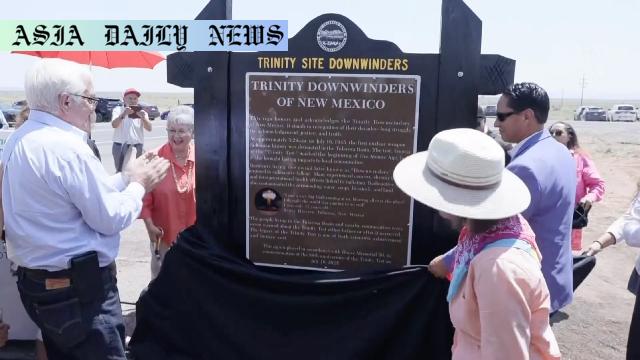nuclear weapons – On the 80th anniversary of the first atomic test in New Mexico, a memorial sign acknowledges radioactive damage.
The 80th anniversary of the first nuclear test in New Mexico was marked with a memorial unveiling.
The sign details the radioactive fallout’s impact and recognizes the suffering of affected residents.
Melissa Parke from ICAN criticized the notion of nuclear deterrence, calling it a dangerous lie.

The Historical Significance of the Trinity Test
On July 16, 1945, a day now ingrained in world history, the first atomic bomb was detonated at the Trinity test site in New Mexico. This marked the advent of nuclear weaponry, a force that would go on to alter the course of global conflicts and human history. The test served as a precursor to the subsequent bombings of Hiroshima and Nagasaki, which together claimed the lives of hundreds of thousands of people and left a harrowing legacy. However, in the minds of many, the devastation did not stop there. Radioactive fallout from the Trinity test reportedly affected local residents and the environment for years, raising ethical questions about the use of nuclear technology and its implications for humanity.
The New Memorial: A Nod to the Forgotten Victims
Marking the 80th anniversary of this historic and tragic event, a new memorial sign has been unveiled in New Mexico. This marker, placed by the state government near the entrance of the test site, highlights not only the historical importance of the event but also acknowledges the enduring trauma it has caused. The sign courageously addresses the damage wrought by radioactive fallout, while also amplifying the voices of affected residents. During the dedication ceremony, attended by around 100 individuals, the memorial stood as a substantial gesture of acknowledgment and an act of remembrance for many who felt their stories had remained untold for decades.
Calls for Global Abolition of Nuclear Weapons
Speaking at the ceremony, Melissa Parke, Executive Director of the International Campaign to Abolish Nuclear Weapons (ICAN), delivered a powerful message on the dangers of nuclear deterrence. She emphasized the existential threat that nuclear weapons pose, debunking the common narrative that they ensure global stability. “The story perpetuated by nuclear arms states that nuclear weapons keep the world safe through deterrence is a grotesque and dangerous lie,” she proclaimed. Her words resonated deeply as attendees reflected not only on the destruction caused 80 years ago but on the current state of nuclear proliferation worldwide. With ongoing geopolitical tensions, the event also served as a clarion call for a renewed commitment to disarmament.
Acknowledging Local Suffering and Community Voices
An attendee at the ceremony from the area directly impacted by the radioactive fallout shared his experience, emphasizing that the newly erected sign reveals the full story behind Trinity—not just as a ‘test’ but as an explosion with far-reaching human consequences. The man expressed the hope that this memorial would bring increased awareness to the long-lasting effects of the test and the broader issue of nuclear proliferation. Locals hope this unveiling is merely the beginning of an ongoing conversation that will lead policymakers toward meaningful action on nuclear disarmament while ensuring that those affected are finally granted recognition and justice.
Looking Ahead: A Safer Future Without Nuclear Weapons
With the U.S. and other major powers still in possession of vast nuclear stockpiles, the new memorial resonates as a timely reminder of what is at stake. The dangers of nuclear proliferation are multifaceted, spanning the catastrophic human impact demonstrated in New Mexico to broader threats of global annihilation. Advocates like ICAN continue to push for stronger international frameworks and treaties aimed at nuclear disarmament. The memorial, in this sense, is not just about reflecting on the past but urging a deeper commitment to creating a future free from the threat of nuclear war. Programs focusing on awareness and education could play a central role in driving further public and political support for this urgent cause.
Commentary
The Legacy of the First Nuclear Test: A Call to Action
The unveiling of a memorial marking the 80th anniversary of the first nuclear test in New Mexico is both admirable and deeply overdue. This acknowledgment serves as a significant step in recognizing not only the residents who suffered due to radioactive fallout but also the ongoing legacy of nuclear weapons. While history often focuses on the scientific triumph of the atomic bomb, reflection on its devastating impact on humanity is equally critical. This memorial helps bridge that gap and paves the way for more inclusive historical dialogue.
Understanding Local and Global Impacts
One of the most poignant aspects of this commemoration lies in its dedication to the individuals and communities directly affected. Their voices, often sidelined in discussions about nuclear technology, demand broader recognition and restorative measures. What makes this moment even more critical is its global resonance. As geopolitical tensions continue to pose threats of nuclear escalation, memorials like these serve as stark reminders of the human cost tied to such weapons. These costs, both ethical and tangible, need to be weighed more heavily in public and policy discussions.
Envisioning a Future Without Nuclear Weapons
While the new marker stands as a powerful symbol of acknowledgment, it must also serve as a catalyst for change. Disarmament efforts, such as ICAN’s advocacy, should gain momentum from initiatives like these. Nations must also invest in education and awareness about the consequences of nuclear warfare to challenge pervasive myths about nuclear deterrence. A future free of nuclear weapons is not an unreachable ideal but an imperative for the survival of humanity. This anniversary, therefore, serves as a timely reminder of what is still at stake and the urgent collective action required to ensure a safer and more just world.


